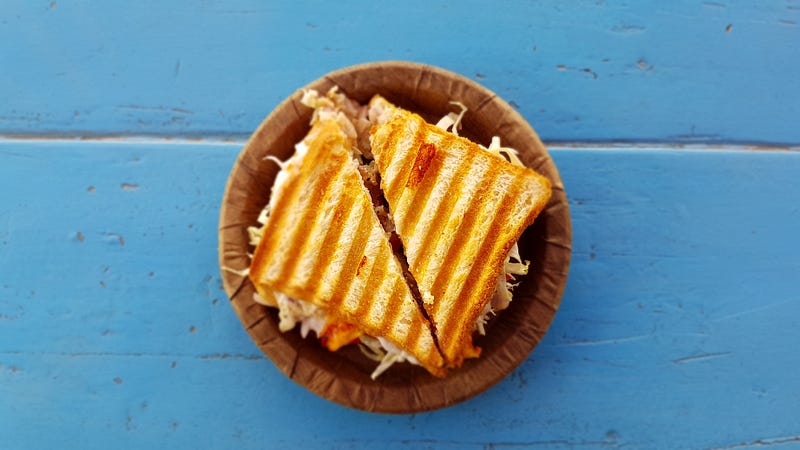
As Ralphie bites into his sprouts, tuna and wheat bread sandwich, Mr. McCall hears a loud crunch. He gives Ralphie the stinkeye, to which Ralphie claims that “it’s the bones in the tuna.”
More stinkeye. Ralphie pushes his sandwich over to Mr. McCall, who opens the sandwich to find potato chips stashed inside.
“You want to make security guard? You have to lose weight.”
Chastened, Ralphie removes the chips.
“Progress, not perfection, Ralphie.”
This scene is from the Denzel Washington movie The Equalizer. But it’s a fundamental lesson for any of us who have ever embarked on a difficult journey towards betterment, be it finishing a degree, dumping weight or rising out of difficult conditions.

Perfection is a myth
Years ago I had a mentor who insisted that I write a short e-book or else he would refuse to keep working with me. The following week I wrote a 200-page book on networking skills. It blew us both away.
However, finishing it escaped me. For the next six years, I kept updating, changing, tweaking, rewriting, editing. There was forever something new to add, a better way to write a sentence. I ran through multiple editors. That book never saw the light of day because I was driving for perfection. The book died an ugly death and still sits on my computer as a manuscript. I re-read it recently. It’s an embarrassing piece of crap writing.
I was chasing a chimera, “a thing that is hoped or wished for but in fact is illusory or impossible to achieve.”

Just Get It Done
In early 2010, I had the idea for a different book, a book about the intense power of words. I hired a book mentor. Nine months later I had the finished product in my hand. That book went on to win three prizes. Surprised the hell out of me. However, the advice I got along the way-other than to put my nose to the grindstone and get the work done- was not to worry about perfection. Does the book have a typo or two? Yup.
Are there sections I might have changed? Yup.
Could I go back and obsess about minutae and details? Yup.
But I didn’t. And that’s why the book got finished. I turned around and wrote an other one right away in three months. That one also won a prize. That also surprised the hell out of me.
Neither of those books was perfect. But they were in every way good enough.

Flawed But Perfect
Anyone who has ever been dogged unmercifully by the need to make something that we create perfect knows the hell we live in when each day we wake up with a brand new idea. We erase, rewrite, start over. Rather than trust our intuition, which is often spot on the first time, we second- guess, challenge and obsess to the point of near-insanity.
For example, our bodies. In a world of air-brushed perfection (which is a lie, since nobody in real life looks like that), we can be driven to nuthood by the search for the perfect pill, the right food/diet/ the magic machine or the guaranteed exercise program to deliver us the body of Adonis or Wonder Woman. It’s an impossible dream but the implied promise keeps a great many gyms, supplement companies, dieticians and machine manufacturers in business. And still we don’t get there.
Nothing in Nature is Perfect, Except That it Is.
“In traditional Japanese aesthetics, Wabi-sabi (侘寂) is a world view centered on the acceptance of transience and imperfection. The aesthetic is sometimes described as one of beauty that is ‘imperfect, impermanent, and incomplete.”’ -Wikipedia
This lovely notion is freeing, when we see it as it is. Even the most perfect flower or plant, the most carefully-cultivated gardens contain imperfections. A gorgeous model’s face most likely has a blemish carefully hidden by makeup. Nothing in Nature is perfect- what is perfect is our ability to accept things as they are, including our own perfect imperfection.

In some world cultures and religions, weaving an imperfection into a piece of cloth or a rug is an acknowledgement that faced with the Authority of Life, nothing is perfect. This act reminds the artist that we are humbled by Forces far larger than we. Our very best is enough. It is the best we can do at any given time.
Incremental Steps
In Ralphie’s case, Mr.McCall did help him make security guard. One small step at a time. As someone who took on the challenge of dumping nearly a hundred pounds, it took me a year of hard, slogging, steady work. There were many days and months when a plateau drove me nuts. You feel like giving up. That donut looks awfully good, and some days you succumb. I sure did. I still do.
Progress, not perfection.
But I got there. That was thirty years ago this year. Every day I am faced with the same choices- the yogurt or the donut (a bowl of yogurt is six inches from my left wrist as I write this). Progress. I can’t expect perfection because I’m not capable of it. I am subject to Forces far greater than I am which remind me regularly of my failings, faults and inadequacies. What I don’t do is let them defeat me, or make stop trying. What I can do is put for the very best efforts I can, whether that’s writing another book, keeping the weight under control, or starting a new business. I am happy with progress. Day by day, inch by inch, brick by brick, dollar by dollar.
The trick is to give ourselves permission to be imperfect, which in and of itself, makes us perfect just as we are. This way, as we strive, we can honor every single small step towards a new goal, recognizing that life is always progress, not perfection.
Comments powered by Talkyard.